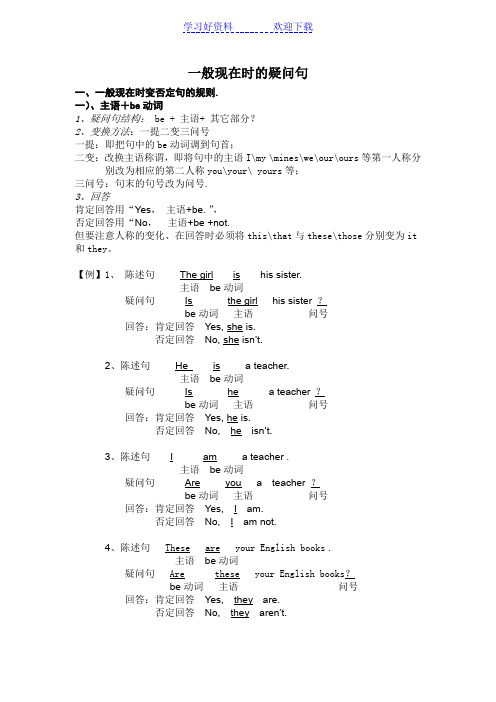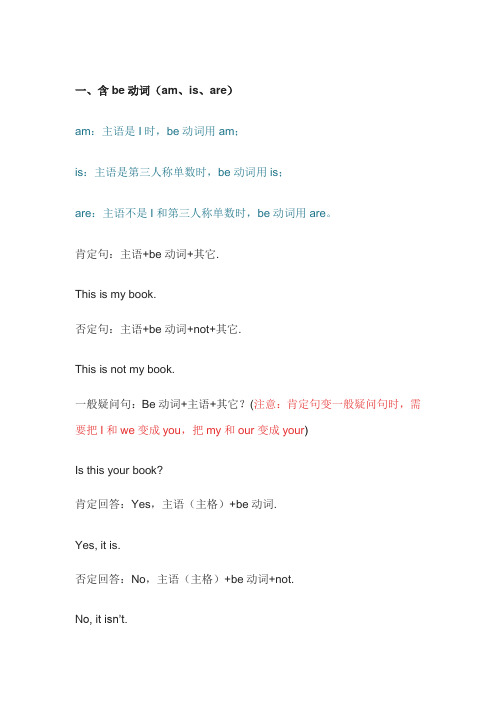一般现在时第三人称单数,疑问句
动词《第三人称单数形式》的变化规则

小学英语动词第三人称单数变化规则一般现在时的肯定句中,主语为第三人称单数的动词变化主要体现在词尾的变化上,其规律为:}1、变否定句:格式为doesn’t/does not + 动词原形,如:He goes to school at six in the morning. (变否定句)→He doesn't go to school at six in the morning.2、变一般疑问句:要借用助动词does,如:She goes home at five every day.→Does she go home at five every day--- Yes, she does./No, she doesn’t.哪些主语是第三人称单数'除I、you之外的所有可数名词单数及不可数名词。
(he she it 个人名)例题引路:判断下列词语哪些是第三人称单数,是请打“√”不是请打“×”。
he ( ) we( ) she( ) they( )it ( ) Han Mei ( ) uncle Wang ( )~the farmers( ) my mother( ) Linda( )Sally and Lucy( ) the dog( ) the cats( )1、写出下列动词的第三人称单数。
drink ________ go _______ stay ________ make ________ look _________ have_______ pass_______ carry _______ come________ watch________ plant_______ fly ________ study_______ brush________ teach________2、用括号内动词的适当形式填空。
1. He often ________(have) dinner at home.(2. We _____________ (not watch) TV on Monday.3. Nick ___________ (not go) to the zoo on Sunday.4. ________ they __________ (like) the World Cup5. What _________they often _________ (do) on Saturdays6. _________ your parents _________ (read) newspapers every day7. There ________(be) some water in the bottle.8. My aunt _______(look) after her baby carefully.9. The child often _______(watch) TV in the evening.10. Mike’s sister ________ (cook) nice food. I _______ (like) eating it very much.21. _______ (do) your brother_______ (watch) TV in the evening No, he_______ (not).)3、选出正确的答案:1. She (like / likes) to play football.2. He (like / likes) drinking milk.3. I (like / likes) to watch TV.4. We (like / likes) to play badminton.5. They (like / likes) to sing songs.6. She (read / reads) books every day.7. He (play / plays) computer games every day.8. It (listen / listens) to the radio every day.[9. Linda (draw / draws) pictures every day.10. Jane and Linda (play / plays) football every day.5、把下列句子变为否定句:1. We like playing football.2. Linda swims every day.3. They like playing games.、4. My father reads newspaper in the evening.7、把下列句子变为疑问句,并做肯定和否定回答。
动词第三人称单数形式构成规则

般现在时动词第三人称单数形式构成规则(一般现在时中主语时第三人称1大多数动词在词尾加“S”如:①stop —stops make —makes read —reads play —plays [z]2、以辅音字母加“ y”结尾的,要先将“ y”变为“ i ”,然后在加“ es”读[iz]女口:fly —flies carry —carries study —studies worry —worries3、以“ s, x, ch, sh ”结尾的,在词尾加“ es”,发音为如:teach —teaches watch —watches4、以“ o”结尾的动词,加“ es”,如:go —goes do —does5、以不发音字母“ e”结尾的开音节词,加“s ”女口:close —closes [iz]6、be 动词包括:am,is ,are 。
第三人称单数用is ;过去式为was ;复数用are ,过去式为were.1. 动词have ,遇到主语是第三人称单数时,要用has ;动词be 的第三人称单数形式是is 。
2. 含有动词第三人称单数形式的句子变否定句时,要用doesn't + 动词原形,如:He goes to school at six in the morning.(变否定句)He does n't go to schoolat six in the morning.3. 对含有动词第三人称单数形式的句子提问时,要用助动词does,如:She goes home at five every day.(对划线部分提问)When / What time does shego home every day?般现在时中的第三人称单数形式在一般现在时中,当主语是第三人称单数时,谓语动词要用第三人称单数形式,原形后加即常在动词-s 或-es 。
I 什么是一般现在时?一般现在时的基本用法有哪些呢?No. 1 】一般现在时的功能1. 表示事物或人物的特征、状态。
英语一般现在时结构(疑问句)

一般现在时的疑问句一、一般现在时变否定句的规则.一)、主语+be动词1、疑问句结构: be + 主语+ 其它部分?2、变换方法:一提二变三问号一提:即把句中的be动词调到句首;二变:改换主语称谓,即将句中的主语I\my \mines\we\our\ours等第一人称分别改为相应的第二人称you\your\ yours等;三问号:句末的句号改为问号.3、回答肯定回答用“Yes,主语+be.”,否定回答用“No,主语+be +not.但要注意人称的变化、在回答时必须将this\that与these\those分别变为it 和they。
【例】1、陈述句The girl is his sister.主语be动词疑问句Is the girl his sister ?be动词主语问号回答:肯定回答Yes, she is.否定回答No, she isn’t.2、陈述句He is a teacher.主语be动词疑问句Is he a teacher ?be动词主语问号回答:肯定回答Yes, he is.否定回答No, he isn’t.3、陈述句I am a teacher .主语be动词疑问句Are you a teacher ?be动词主语问号回答:肯定回答Yes, I am.否定回答No, I am not.4、陈述句 These are your English books.主语be动词疑问句Are these your English books?be动词主语问号回答:肯定回答Yes, they are.否定回答No, they aren’t.5、陈述句This is your English books .主语be动词疑问句Is this your English books?be动词主语问号回答:肯定回答Yes, It is.否定回答No, It isn’t二)、主语+情态动词1、疑问句结构:情态动词+ 主语+ 动词原形+ 其它部分?2、变换方法:一提二变三问号一提:即把句中的情态动词调到句首;二变:改换主语称谓,即将句中的主语I\my \mines\we\our\ours等第一人称分别改为相应的第二人称you\your\ yours等;三问号:句末的句号改为问号.3、回答肯定回答用“Yes,主语+情态动词.”,否定回答用“No,主语+情态动词+not但要注意人称的变化【例】1、陈述句I can speak English.主语be动词疑问句Can you speak English ?be动词主语问号回答:肯定回答Yes, I can.否定回答No, I can’t.三)、主语+实义动词1、疑问句结构当主语是第一人称;第二人称及第三人称复数及复数名词时:结构:Do+主语+实义动词+其他当主语是第三人称单数及单数名词时结构:Does+主语+实义动词原形+其他【例】1、陈述句He plays Ping-pang every day.主语义动词的第三人称单数形式疑问句Does he play Ping-pang every day.Does 主语动词原型回答:肯定回答Yes, he does.否定回答No, he doesn’t.四)、注意1、含有have和has的句子变成疑问句,把have和has看着实义动词,用do和does提问,但has要变成have【例】1、陈述句I have big eyes..疑问句Do you have big eyes?回答:肯定回答Yes,I do.否定回答NO,I don't.2、陈述句She has a small mouth.疑问句Does she have a small mouth?回答:肯定回答Yes,she does.否定回答No, she doesn't.2、见到some 变否定句时,要换成any.3、见到and 变否定句时,要换成or.4、见到too和also变否定句时,要换成either.5、见到already变否定句时,要换成yet。
一般现在时动词第三人称单数变化规则

F0第三人•仏lb —* 二;- '■:2洱「'TT• r^Company number : [0089WT-8898YT-W8CCB-BUUT-202108]-般现在时的概念和用法:表示现阶段经常、反复、习惯性的动作;表示目前的状况;表示自然界的客观真理。
二.一般现在时的结构时态的结构指的是动词的变化形式。
一般现在时间有两种结构,一种是动词原形,用于主语为非第三人称时的情况;另一种为动词的第三人称单数形式,用于主语为第三人称时的情况。
EgL We often get up early in the morning.Eg2・ My father often gets up early in the morning.三、谈谈“主语为三单,其后动词S添”在一般现在时中,当主语为第三人称单数时,谓语动词要用第三人称单数形式。
可以简单叙述为“主语为三单,其后动词S添,律何谓第三人称单数用一句话概括就是“非你、非我、非复数二如he.she, it. my father, iny mother, my sister, our English teacher, Tom, Mike, Liu Jia, China, iny book, etc. sometimes goes to school by bike.father works in the hospital as a doctor-四、一般现在时的肯定句中,主语为第三人称单数的动词变化主要体现在词尾的变化上,其规律(与名词变成复数的变法大致相同。
)五.一般现在时的句子转换(1)当句子中有be动词或情态动词时,则把be动词或情态动词(can.could等等)提到主语的前面变成一般疑问句;在be动词或情态动词后面加not变成否定句•例: ①陈述句:She is a student.—般疑问句f k she a student否定句f She is not a student.②陈述句:I can swim.—般疑问句f Can you swim否定句f I can not swim.⑵ 当句子中即没有be动词,也没有情态动词时,则在主语前加助动词do (you,以及复数),does (单数she,heat)变成一般疑问句;在主语后谓语动词前加助动词doift (Lyou,以及复数),doesift(单数she,he4t)变成否定句,助动词后的动词要变成动词原形。
一般现在时肯定句、否定句和疑问句的结构

一、含be动词(am、is、are)am:主语是I时,be动词用am;is:主语是第三人称单数时,be动词用is;are:主语不是I和第三人称单数时,be动词用are。
肯定句:主语+be动词+其它.This is my book.否定句:主语+be动词+not+其它.This is not my book.一般疑问句:Be动词+主语+其它?(注意:肯定句变一般疑问句时,需要把I和we变成you,把my和our变成your)Is this your book?肯定回答:Yes,主语(主格)+be动词.Yes, it is.否定回答:No,主语(主格)+be动词+not.No, it isn’t.特殊疑问句:特殊疑问词+be动词+主语+其它?What’s this? (对肯定句中的my book提问)二、含情态动词(can)肯定句:主语+情态动词+动原+其它.I can play football.否定句:主语+情态动词+not+动原+其它.I can’t play football.一般疑问句:情态动词+主语+动原+其它?(注意:肯定句变一般疑问句时,需要把I和we变成you,把my和our变成your)Can you play football?肯定回答:Yes,主语(主格)+情态动词.Yes, I can.否定回答:No,主语(主格)+情态动词+not.No, I can’t.特殊疑问句:特殊疑问词+情态动词+主语+动原+其它?(注意:对肯定句中某一部分提问时,若提问部分包含动词,则用do替换这个动词)What can you do? (对肯定句中的play football提问)三、含实意动词(不含be动词或情态动词)①主语是三单(第三人称单数)肯定句:主语+动词单数形式+其它.Xiao Ming plays game with his friend.否定句:主语+doesn’t+动原+其它.Xiao Ming doesn’t paly game with his friend.一般疑问句:Does+主语+动原+其它?(注意:肯定句变一般疑问句时,需要把I和we变成you,把my和our变成your)Does Xiao Ming play game with his friend?肯定回答:Yes,主语(主格)+does.Yes, he does.否定回答:No,主语(主格)+doesn’t.No, he doesn’t.特殊疑问句:特殊疑问词+does+主语+动原+其它?(注意:对肯定句中某一部分提问时,若提问部分包含动词,则用do替换这个动词)What does Xiao Ming do with his friend? (对肯定句中plays game提问)②主语不是三单肯定句:主语+动原+其它.My parents buy a phone for me.否定句:主语+don’t+动原+其它.My parents don’t buy a phone for me.一般疑问句:Do+主语+动原+其它?(注意:肯定句变一般疑问句时,需要把I和we变成you,把my和our变成your)Do your parents buy a phone for you?肯定回答:Yes,主语(主格)+do.Yes, they do.否定回答:No,主语(主格)+don’t.No, they don’t.特殊疑问句:特殊疑问词+do+主语+动原+其它?(注意:对肯定句中某一部分提问时,若提问部分包含动词,则用do替换这个动词)What do your parents buy for you? (对肯定句中的a phone提问)。
英语动词《第三人称单数形式》的变化规则

英语动词第三人称单数变化规则一般现在时的肯定句中,主语为第三人称单数的动词变化主要体现在词尾的变化上,其规律为:规则原形第三人称单数形式1、一般情况下,直接在动词词尾+s gettakeplaygetstakesplays2、以s, x, sh, ch, o结尾的动词,在词尾+ es guessfixfinishteachgo和doguessesfixesfinishesteachesgoes和does3、以辅音字母+ y 结尾的动词,先把y变为i,再加es studytryflycarryworrystudiestriesfliescarriesworries4、不规则动词(特殊情况)havebehasis1、变否定句:含有动词第三人称单数形式的句子变否定句时,要在动词前面加上doesn’t 或does not,动词的第三人称单数形式要还原成原形:格式为doesn’t/does not + 动词原形,如:He goes to school at six in the morning. (变否定句)→He doesn't go to school at six in the morning.2、变一般疑问句:把含有动词第三人称单数形式的变成一般疑问句时,要借用助动词does,如:She goes home at five every day.→Does she go home at five every day?--- Yes, she does./No, she doesn’t.哪些主语是第三人称单数?1、人称代词he, she, it;如:He likes watching TV. 他喜欢看电视。
She has lunch at twelve. 她十二点吃午餐。
It looks like a cat. 它看起来像只猫。
2、单个人名、地名或称呼作主语;是第三人称单数。
如:Han Mei looks like her mother. 韩梅看起来像她的母亲。
(完整版)一般现在时第三人称单数形式用法+练习
一般现在时中的第三人称单数形式在一般现在时中,当主语是第三人称单数时,谓语动词要用第三人称单数形式,即常在动词原形后加-s或—es。
(一)什么是一般现在时?一般现在时的基本用法有哪些呢?【一般现在时的功能】1.表示事物或人物的特征、状态。
如:The sky is blue.天空是蓝色的。
2。
表示经常性或习惯性的动作。
如:I get up at six every day。
我每天六点起床。
3。
表示客观现实。
如:The earth goes around the sun.地球绕着太阳转.(二)哪些主语是第三人称单数?现归纳总结如下:一、人称代词he, she, it是第三人称单数.如:He likes watching TV。
他喜欢看电视。
She has lunch at twelve。
她十二点吃午餐.It looks like a cat。
它看起来像只猫.二、单个人名、地名或称呼作主语;是第三人称单数.如:①Tom looks like her mother。
韩梅看起来像她的母亲.②Beijing is in China. 北京在中国.③Uncle Wang often makes cakes. 王叔叔经常做蛋糕。
三、单数可数名词或"this / that / the+单数可数名词"作主语时,是第三人称单。
如:①A horse is a useful animal. 马是有用的动物。
②This book is yours. 这本书是你的.③That car is red. 那辆小汽车是红色的.④The cat is Lucy's. 这只猫是露茜的.四、不定代词someone, somebody, nobody, everything, something等及指示代词this, that 作主语时,是第三人称单数。
如:①Everyone is here. 大家到齐了.②There is something wrong with the watch。
动词第三人称单数的变化规则及练习
动词第三人称单数的变化规则一、使用情况:在一般现在时中,当主语是第三人称单数时,谓语动词要用第三人称单数形式,即常在动词原形后加-s或-es。
(标志词usually often always sometimes every等)二、变化规则1、直接在动词后+s 例如:like- likes play-plays2、以s, x, sh, ch, 接尾的动词:直接在动词后+es 例如:wash-washes3、以辅音+o接尾的动词:直接在动词后+es 例如:go-goes4、以辅音字母+y接尾的动词:把y为变为i,再+es 例如:fly-flies 以元音字母+y接尾的动词后+s例如:play-plays5、除上述规律外,还应注意下面三点:1)动词have ,遇到主语是第三人称单数时,have变成has;动词be 的第三人称单数形式是is。
2)含有动词第三人称单数形式的句子变否定句时,要用doesn't + 动词原形,如:He goes to school at six in the morning. (变否定句)→He doesn't go to school at six in the morning.3)对含有动词第三人称单数形式的句子提问时,要用助动词does如:She goes home at five every day. (对划线部分提问)→When / What time does she go注意:不规则变化:have-----has,be-------is,do-----does动词第三人称单数的变化规则一、使用情况:在一般现在时中,当主语是第三人称单数时,谓语动词要用第三人称单数形式,即常在动词原形后加-s或-es。
(标志词usually often always sometimes never every等)二、变化规则1、直接在动词后+s 例如:like- likes play-plays2、以s, x, sh, ch, 接尾的动词:直接在动词后+es 例如:wash-washes3、以辅音+o接尾的动词:+es 例如:go-goes4、以辅音字母+y接尾的动词:把y变为i,再+es 例如:fly-flies 以元音字母+y接尾的动词后+s例如:play-plays5、除上述规律外,还应注意下面三点:1)动词have ,遇到主语是第三人称单数时,have变成has;动词be 的第三人称单数形式是is。
人教版小升初英语一般现在时疑问句练习题50题【含答案解析】
人教版小升初英语一般现在时疑问句练习题50题【含答案解析】1.Do you like apples?A.Yes, I do.B.No, I don't.C.Yes, he does.D.No, she doesn't.答案解析:A。
选项 A 表示“是的,我喜欢”,与问句主语和助动词一致,正确。
选项 B 表示“不,我不喜欢”,虽然否定回答正确,但与题干要求的肯定回答不符。
选项C 和 D 的主语分别是he 和she,与问句主语you 不一致,错误。
本题考查一般现在时疑问句的回答,助动词do 提问,用do 或don't 回答,主语要一致。
2.Does he go to school by bike?A.Yes, he do.B.No, he doesn't.C.Yes, she does.D.No, I don't.答案解析:B。
选项 B 表示“不,他不骑自行车去上学”,与问句主语和助动词一致,正确。
选项 A 助动词错误,应该是does。
选项 C 的主语是she,与问句主语he 不一致,错误。
选项 D 的主语是I,与问句主语he 不一致,错误。
本题考查一般现在时疑问句的回答,助动词does 提问,用does 或doesn't 回答,主语要一致。
3.Do they play football after school?A.Yes, we do.B.No, they don't.C.Yes, he does.D.No, she doesn't.答案解析:B。
选项 B 表示“不,他们放学后不踢足球”,与问句主语和助动词一致,正确。
选项 A 的主语是we,与问句主语they 不一致,错误。
选项 C 和 D 的主语分别是he 和she,与问句主语they 不一致,错误。
本题考查一般现在时疑问句的回答,助动词do 提问,用do 或don't 回答,主语要一致。
一般现在时的疑问句和回答
一般现在时的疑问句和回答1. 什么是一般现在时?一般现在时是描述现在正在发生的动作、存在的状态或经常性的惯的一种时态。
它用于说明普遍真理、固定的时间表和经常性的行为。
2. 如何构成一般现在时的疑问句?一般现在时的疑问句通常由以下结构构成:1. 助动词"Do" / "Does" + 主语 + 动词原形 + 其他?主语可以是第一人称单数、第二人称单数或第三人称单数。
助动词"Do"用于第一人称单数和第二人称单数,助动词"Does"用于第三人称单数。
动词使用原形,后面可以加上其他补充内容。
例如:- Do you like ice cream?- Does he play soccer?2. 一般疑问句的否定形式一般疑问句的否定形式可以通过在助动词后添加"not"构成。
例如:- Don't you live in New York?- Doesn't she speak English?3. 如何回答一般现在时的疑问句?一般现在时的疑问句可以有以下几种回答方式:1. 肯定回答:通常使用"Yes"回答。
例如:- Do you like ice cream? - Yes, I do.- Does he play soccer? - Yes, he does.2. 否定回答:通常使用"No"回答。
例如:- Do you like ice cream? - No, I don't.- Does he play soccer? - No, he doesn't.3. 陈述回答:在回答时直接陈述事实而非使用"Yes"或"No"。
例如:- Do you like ice cream? - I prefer cake.- Does he play soccer? - He plays basketball instead.4. 疑问词的使用在一般现在时的疑问句中,有时需要使用疑问词来询问特定的信息。
- 1、下载文档前请自行甄别文档内容的完整性,平台不提供额外的编辑、内容补充、找答案等附加服务。
- 2、"仅部分预览"的文档,不可在线预览部分如存在完整性等问题,可反馈申请退款(可完整预览的文档不适用该条件!)。
- 3、如文档侵犯您的权益,请联系客服反馈,我们会尽快为您处理(人工客服工作时间:9:00-18:30)。
,. 小学英语语法时态讲解与归纳
—、一般现在时 意义:表示经常发生的事情,动作或存在的状态 二. 构成及变化 1.be动词的变化 肯定句:主语+be(am,is,are)+其它。 如: I am a boy.我是一个男孩。 否定句:主语+ be + not +其它。 如:He is not a worker.他不是工人。 一般疑问句:Be +主语+其它。 如:-Are you a student? -Yes. I am. / No, I'm not. 特殊疑问句:疑问词+一般疑问句。如:Where is my bike? 2. 行为动词的变化 ( l )当主语为第一,二人称及复数时,助动词为do 肯定句:主语+动词原(+它)。 如: We often play basketball after school. 否定句:主语+ don't+动词原形(+其它)。 如:we don’t play basketball after school. 一般疑问句:Do +主语+动词原形+其它? 如:Do you often play basketball after school l? Yes, we do. / No, we don't. 特殊疑问句:疑问词+以do开头的一般疑问句? 如: What do you often do after school ? ,. (2)当主语为第三人称单数时, 助动词为does
肯定句:主语+动词三单式(+其它)。 如:He swims well. 否定句:主语+ doesn’t+动词原形(+其它)。 如:He doesn’t swim well. 一般疑问句:Does +主语+动词原形+其它。 如:Does he swim well ? Yes, he does. / No, he doesn't. 特殊疑问句:疑问词+以does开头的一般疑问句? 如:How does your father go to work? 三.第三人称单数的动词变化规则 (只有在第三人称为主语的肯定句中,动词才用三单式) (1)多数动词直接加s: runs gets likes collets takes plays climbs……. (2)结尾是s, x, sh, ch, o,前为辅音字母, 结尾加es : watches teaches goes does washes crosses mixes brushes (3)动词末尾y前为辅音:将y改为i加es: study→studies fly→flies carry→carries cry→cries但在y前如果为元音则直接加s: buys says 四.时间标志: always , usually , often , sometimes ,every… ,. 一般现在时练习
He often (have) dinner at home. Daniel and Tommy (be) in Class One. We (not watch) TV on Monday. Nick (not go) to the zoo on Sunday. they (like) the World Cup? What they often (do) on Saturdays? your parents (read) newspapers every day? The girl (teach) us English on Sundays. She and I (take) a walk together every evening. There (be) some water in the bottle. Mike ____ (like) cooking. They ____ (have) the same hobby. My aunt ____(look) after her baby carefully. You always ______(do) your homework well. I (be) ill. I’m staying in bed. She (go) to school from Monday to Friday. Liu Tao _____ (do) not like PE. The child often _____ (watch) TV in the evening. Su Hai and Su Yang ____ (have) eight lessons this term. -What day ___ (be) it today? -It’s Saturday Winter, spring, summer and autumn (be)seasons. ,. Danny (take) off his T-shirt now.
Today Mr.Wood (teach) a science lesson. Jenny and I (live) in Canada. Jenny (want) to go to school in china Let me (help) you
She eats a sandwich(总是) Li Ming goes to school by bicycle(有时)。 Kim wears a red dress(通常)。 Jenny sometimes (ride) to school. Tom never (do) computer games. 一、将下列句子译成英语 1. 汤姆喜欢英语。
2. 他们看电视。 3. 杰克是个老师。 4. 妈妈在11点吃午饭。 5. 我们踢足球。 一、写出下列动词的第三人称单数 drink ________ go _______ stay ________ make ________ look _________ have_______ pass_______ carry ____ come________ watch______plant_______ fly ____,. ____ study_______ brush________ do_________ teach_______
wash_________ match _______guess______ study______ finish_________ go________ snow______ carry_________ stop______ see________ drive ________let_______ carry______ keep_____ join______ find_______ think________ teach______ catch______ stay_______ begin______ forget_______ forget______ lie________ die _______ run_______ prefer______ give________ ring_______ dance______ hope_______
用所给词的正确形式填空 We often___________(play) on the playgound. He _________(get) up at six o’clock. __________you _________(brush) your teeth every morning. What____ (do) he usually _____(do) after school? Danny _______(study) English, Chinese, Maths, Science and Art at school. Mike sometimes __________(go) to the park with his sister. At eight at night, she ________(watch) TV with his parents. ________ Mike________(read) English every day? How many lessons ______your classmate____(have) on Monday? What time ____his mother_________(do) the housework? He often ______(have) dinner at home. Daniel and Tommy___ (be) in Class One. ,. We____ (not watch) TV on Monday.
Nick _____(not go) to the zoo on Sunday. They______ (like) the World Cup? What ____they often ____(do) on Saturdays Your parents________ (read) newspapers every day? The girl______ (teach) us English on Sundays. She and I _______(take) a walk together every evening. There_______ (be) some water in the bottle. Mike ______(like) cooking. They_______ (have) the same hobby. My aunt______ (look) after her baby carefully. You always____ (do) your homework well. I_____ (be) ill. I’m staying in bed. She_____ (go) to school from Monday to Friday. Liu Tao _____(do) not like PE. The child often______ (watch) TV in the evening. Su Hai and Su Yang ______(have) eight lessons this term. -What day ______(be) it today? - It’s Saturday. Don’t make a noise. Grandpa __________(sleep). Tom’s family__________(watch) TV. It ________(take) me two hours to finish my homework last night. What ______ your mother _______(do) every evening? She _______(wash) clothes.
